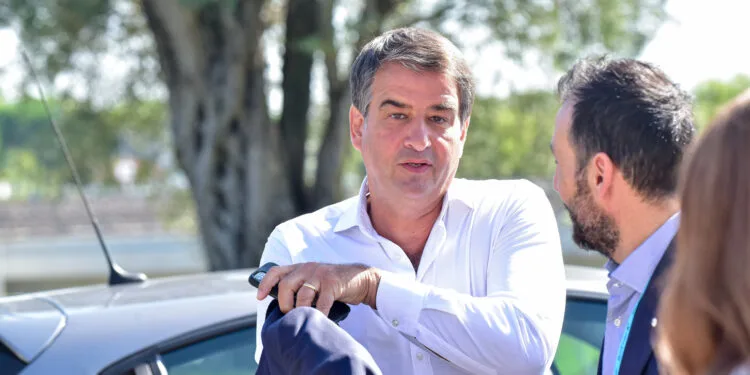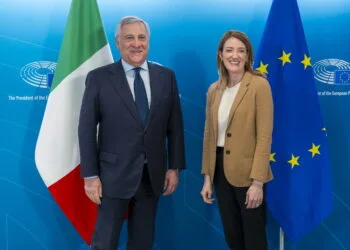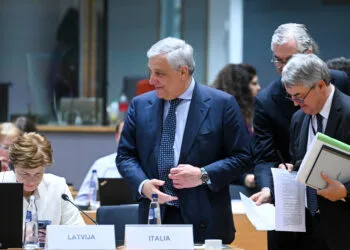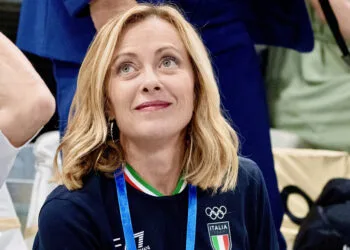Brussels – At last, the official word came from the Council of Ministers in Rome, with just hours to go before the deadline: the Italian candidate for the second Ursula von der Leyen-led College is Raffaele Fitto, as widely anticipated in recent months in the Italian and international press. It will be his first experience in the EU executive if he passes the EU Parliament’s hearings. But the Fratelli d’Italia executive is a seasoned politician, with many posts in our country and Brussels behind him.
Fifty-five-year-old Fitto is from Maglie, in the province of Lecce, where Aldo Moro was born. His political career, all within the centre-right area, began in the Christian Democracy party when, in 1988, his father, Salvatore, passed away while serving as President of the Puglia region. In 1990, he joined the Regional Council in the DC quota and, between 1995 and 1998, was vice president of the region. That same year, he joined Silvio Berlusconi’s moderate centre-right project, the Polo per le libertà, to be elected to the European Parliament in the ranks of Forza Italia in 1999. He resigned the following year after winning the region’s presidency, becoming the youngest governor in Italy’s Republican history. He tried again in 2005 but lost to the communist candidate, Nichi Vendola.
Between 2006 and 2014, he was deputy in the lower house of parliament for Forza Italia, which nominated him as minister of Regional Affairs in Berlusconi’s fourth government (2008–2011). At the European elections in 2014, he was elected and participated in the seventh term of the EU Parliament. Fitto broke from the Berlusconi line in 2015, in controversy with the so-called Nazareno Pact with the Democratic Party then led by Matteo Renzi, and at the same time switched to the Conservatives and Reformists (ECR) in Strasbourg where, in February 2019, he facilitated the entry of FDI. In March 2018, he participated in the legislative elections with the Centrist Union (UDC) as the “fourth leg” of the centre-right coalition. Still, in December of the same year, he switched to Fratelli d’Italia.
With the Melonians, he returned to the EU Parliament in June 2019, gaining the co-chairmanship of the Conservative Group. He retried his assault on the Puglia region in June the following year but was defeated by incumbent governor Michele Emiliano (PD). In October 2022, after the last legislative elections, he became the Ministry of European Affairs and obtained the mandate to the NRRP, Cohesion Policy, and the South.
Moreover, the moderate conservative credentials of Fitto, whose European commitment has never been questioned even by political opponents, would seem to be welcomed by the European People’s Party (EPP), which remained the largest political force in the EU with last June’s European elections. And the leader-boss of the EPP, Manfred Weber, was in talks yesterday with Giorgia Meloni about the thawing technical trials between the premier and the Christian Democrats after the abstention of the Italian prime minister on the appointment of von der Leyen and the dissenting vote of the FdI group in Strasbourg and to definitively incense, even in Brussels, the Salento minister’s candidacy as a member on the Italian quota in the von der Leyen College 2.0.
Therefore, the road for Fitto seems all downhill, given the substantial support of the EPP, confirmed by the pinwheel of meetings not only of the President of the Council but also of Deputy Prime Minister Antonio Tajani, who yesterday (August 29) met in Brussels the in pectore President of the Commission and that of the EU Parliament Roberta Metsola. Moreover, the autumn hearings, which will put him under the MEPs’ thumb, should not be a problem, given that in these very hours, there has also been support from the Dem opposition, with newly elected European MP Antonio Decaro (former mayor of Bari and President of Anci) who hoped the countryman would get the office.
English version by the Translation Service of Withub







